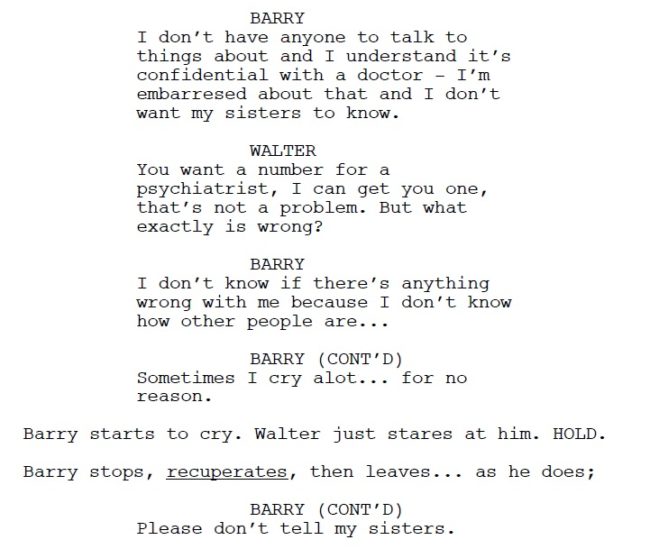This Week's Script Cavalcade: Punch-Drunk Love
 This week’s Cavalcade has us delving deep into the lovelorn lullaby that is Paul Thomas Anderson’s 2002 romantic-dramedy Punch-Drunk Love. It's a screenplay that boasts one of the most bizarre but exceedingly endearing schlubs since Marty. It’s a tale that uses a full range of emotional and cinematic language to convey a heartbreaking yarn of yearning and arrival at acceptance. Romantic, existential, and otherwise.
This week’s Cavalcade has us delving deep into the lovelorn lullaby that is Paul Thomas Anderson’s 2002 romantic-dramedy Punch-Drunk Love. It's a screenplay that boasts one of the most bizarre but exceedingly endearing schlubs since Marty. It’s a tale that uses a full range of emotional and cinematic language to convey a heartbreaking yarn of yearning and arrival at acceptance. Romantic, existential, and otherwise.
The quick run-through: Loveable and lovesick Barry Egan is eking his way through existence. Continually battered and emasculated by his domineering seven sisters and working a dead-end job, he’s quickly reaching the end of his rope. Loneliness is the only enduring constant of the day. It’s just misery Monday through Friday.


But then a beacon of light wafts in. And he’s introduced to lilting and lovely Lena Leonard. And she, in turn, introduces a little wattage into his dimming and emotionally imperiled life. But between him and his last remaining chance at happiness lays a gauntlet of blackmailing phone-sex operators, a goon squad of boorish brothers, and Barry’s own inclination to self-sabotage a good thing. Love teeters precariously in the balance. And we’re along for the ride and root for the galoot throughout.

The screenplay lays on the symbolism pretty thick. From page one we’re befuddled by a wayward and mysterious harmonium that inexplicably ends up in Barry’s possession. This little organ, drubbed and discarded, becomes a visual surrogate for his own heart. This innocuous little instrument symbolizes a chance at romantic opportunity. Like love, it arrives unexpectedly (the harmonium is abandoned on a lonely road after a horrific car crash on page one). When Barry pilfers the harmonium from the curb he finds it a little worse for wear. But he nurtures it. He takes the time to coax it into something aurally beautiful. He mends the billows with duct tape, and the act becomes a redemptive gesture of nursing his own internal wounds.

As the story progresses, beleaguered Barry will steal away to these little solitary interludes. He’ll brush a key and release a mournful chord that reflects his current inner turmoil. Scene after scene passes, and he soon starts to find a rhythm. And the larger the role Lena plays in his life, the more dulcet his tunes start to become. It’s all a very rich metaphor for the effort and strain falling in love takes on the heart. The script seems to suggest, akin to playing Carnegie Hall, that intimacy requires practice, practice, practice. And by movie’s end, they’ve learned to make swelling, symphonic music together.


The telephone also plays a prominent symbolic role. The telephone becomes an apparatus of anxiety and tension for Barry. Trouble seems to ineluctably ensue whenever he reaches for one. It’s the source of unending woe that keeps coming in waves. From the phone scam that empties his pockets to the perpetual haranguing he receives from his sisters. A ringing phone is the harbinger of heartache for Barry. And quickly represents all that is alienating and lobs him further into loneliness. But as his relationship with Lena grows stronger, he wades deep within himself and discovers newfound funds of courage heretofore unavailable to him. He sheds the telephone permanently from his life. And severs any lingering insecurities it symbolizes.

It’s a riveting read. And proffers many a canny lesson in injecting subtle symbolism into a story. The screenplay packs a compact wallop at only ninety pages. But each page is just drenched in deliberate characterization and pronounced visual pathos.
So stock up on the pudding and be frequently-flown away to a world of revealing and romantic reverie. I’ll say with no exaggeration: This script is very food.

And when you’re finished with Punch-Drunk Love, feel free to peruse and pluck out some of these latest acquisitions in the library.
- CBS television drama Picket Fences created by David E. Kelley.
- Crime-drama Wiseguy created by Stephen J. Cannell.
- CBS sitcom Newhart created by Barry Kemp.
- Gimlet Media’s popular podcast Homecoming penned by Eli Horowitz and Micah Bloomberg.
- And spare a picosecond to have a poke-about and palaver over the new First Pages: 1931 to 2016 exhibit in the library lobby.
And I would say that’s that, mattress man.

